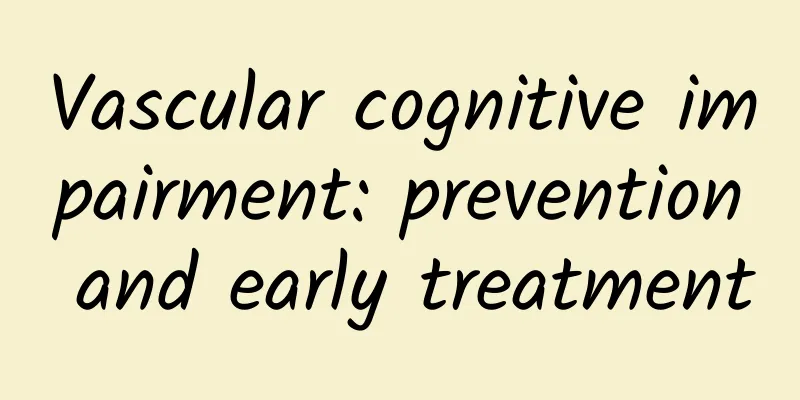Vascular cognitive impairment: prevention and early treatment

|
Author: Huang Li'an, Chief Physician of the First Affiliated Hospital of Jinan University Reviewer: Zhao Haiyan, deputy chief physician, Peking University Third Hospital With the development of society, changes in people's dietary structure and the "Westernization" of their living habits have become increasingly obvious. The number of people with "three highs" (high blood pressure, high blood lipids (hyperlipidemia) and high blood sugar (diabetes) has increased significantly, and overweight and obesity are becoming more common. These are common risk factors for stroke. With the increase in the incidence of stroke, the incidence of vascular cognitive impairment (also known as "vascular dementia") has also increased. For vascular cognitive impairment, prevention, early identification and early treatment are crucial to improving patient prognosis. 1. The concept of vascular cognitive impairment Vascular cognitive impairment is a syndrome of overall brain intellectual decline caused by cerebrovascular disease and its risk factors or problems with the brain's blood supply (such as cerebral ischemia, hypoxia, and cerebral hemorrhage). Figure 1 Copyright image, no permission to reprint 2. Prevention of Vascular Cognitive Impairment Vascular cognitive impairment is the only type of cognitive impairment that can be prevented and treated. Its mild symptoms include headaches, dizziness, insomnia, tinnitus, and fatigue. Patients also experience memory loss, and as the disease progresses, they have difficulty in daily life and work. Vascular cognitive impairment also affects the patient's mood. The patient is prone to excitement and sadness, and often loses his temper or cries over trivial matters. As the disease progresses, the patient's memory becomes worse and worse, and it is difficult to recall past events. Prevention is the key to vascular cognitive impairment. Doing the following will help avoid the onset of the disease. 1. The diet should be low in fat, salt and sugar, and the intake of foods with high cholesterol content should be limited. It is advisable to eat more vegetables and fruits. 2. Develop good living habits, maintain a regular schedule, and ensure adequate sleep. 3. Strengthen physical exercise and participate in more cultural and entertainment activities. 4. Patients with hypertension, hyperlipidemia and diabetes should pay special attention to changes in blood pressure, blood lipids and blood sugar to prevent overweight and obesity. 5. Quit smoking and limit alcohol intake. 6. Study more, use your brain more, strengthen memory training, and cultivate interests and hobbies. 7. Maintain an optimistic attitude, actively participate in social activities, and maintain good interpersonal and family relationships. Figure 2 Copyright image, no permission to reprint Treatment of vascular cognitive impairment Early detection of vascular cognitive impairment can allow effective measures to be taken before patients develop intellectual problems, thereby preventing the progression and deterioration of the disease. 1. Drug treatment: Currently, the treatment drugs for vascular cognitive impairment mainly focus on improving brain cell metabolism, brain blood circulation and drugs acting on neurotransmitters. 2. Traditional Chinese medicine treatment: mainly Chinese medicine and acupuncture therapy. It can delay and alleviate vascular cognitive impairment, improve the quality of life of patients, and reduce the burden on families and society. 3. Cognitive rehabilitation training: Cognitive rehabilitation training is an important part of the treatment of vascular cognitive impairment. Through professional training programs, such as memory training, attention training, thinking training, etc., it can help patients improve their cognitive function and improve their quality of life. 4. Psychological support and social participation: Patients with vascular cognitive impairment often have emotional problems and social adaptation disorders. Therefore, psychological support and social participation are also crucial for the patient's recovery. Family members and society should give patients enough care and support, encourage them to participate in social activities, and maintain a positive and optimistic attitude. Figure 3 Copyright image, no permission to reprint Vascular cognitive impairment is a preventable and treatable disease. Through active preventive measures and timely treatment intervention, its occurrence and development can be effectively delayed, brain health can be protected, and quality of life can be improved. |
<<: A physical examination revealed elevated "tumor markers". How far away is cancer?
>>: Can dialysis patients still receive anesthesia and surgery?
Recommend
What should I do if I don't want to be pregnant for a few days?
Some couples have an unexpected pregnancy due to ...
Pay attention to abdominal distension and pain, it may be caused by borderline ovarian tumor
Ovarian tumors can be divided into many types, an...
Is it normal to have blood clots after medical abortion?
Generally speaking, the gestational sac will be d...
Why is there occasional bleeding when there is no inflammation?
When a woman has vaginal bleeding, the first thin...
What are the dangers of breast augmentation?
All female friends hope to have a pair of proud b...
How long will it take for the second baby to be born?
As policies gradually open up, many families are ...
Is the pregnancy a boy or a girl?
Nowadays, pregnant women need to pay attention to...
Uterine fibroids during pregnancy
Nowadays, many pregnant women suffer from uterine...
Women's urine suddenly turns red
Urine is an important excrement of the human body...
What to do if your period does not come normally after a miscarriage
With the rapid development of today's society...
How long do the side effects of emergency contraception last?
How long the side effects of contraceptives last ...
Beware! These three mushrooms are extremely toxic
Whenever a netizen asks the question "Is thi...
What to do if the vulva of a pregnant woman is swollen and painful
During pregnancy, many pregnant women experience ...
Can pregnant women eat black vinegar?
Many expectant mothers like to add a lot of nutri...
What to do if you have a cold and fever during pregnancy
We all know that women's immunity is particul...








![[Medical Q&A] Do you know the importance of eyelashes to vision protection?](/upload/images/67f0e3268ec94.webp)
